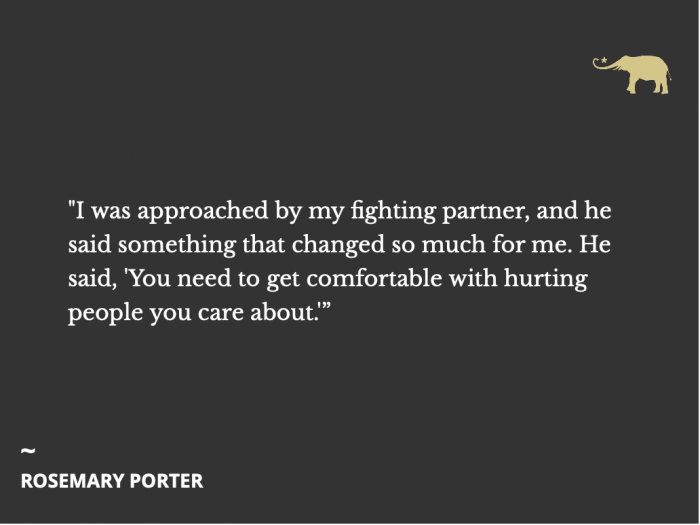On the weekends, I enjoy putting on 5 to 10 lbs. of chain mail, padding, and an ocular helmet from the 10th century.
I grab a wooden shield and ax and learn how to fight guys three times my size.
Looking at my rockabilly photos, you would not think I would undertake such a hobby. Fighting in Viking reenactments has helped me overcome crippling mental barriers of which traditional therapy simply could not.
Although I am a psychologist, I do not believe talk therapy is always the most effective. Talking can only achieve so much, but my philosophy is that the best treatment is in doing.
Doing breaks those mental barriers because a mind-body connection disintegrates the emotional stagnation that wells up during a talk session. Any physical activity, be it 10th-century Norse fighting, Shashka spinning (my personal favorite), or even running, may help us break out of the mental hamster wheel. Unfortunately, talking can sometimes keep us on the wheel.
For me, it has been taking on the role of a shield maiden and learning how to fight like a Viking that has been obliterating the cerebral fortresses I built up in my mind since I was a child. There is something empowering about facing an opponent much bigger than ourselves, taking stock of our personal mental and material inventory, and directly confronting the situation head-on with nothing more than your wits, ax, and shield.
There is no choice but to believe in ourselves, trust our training and experience, and act.
Unless we want a 250 lb. man whack-a-mole us in the head at 100 percent force, we are going to break through those mental barriers, connect to our mind and body, and strike!
Right now, my thrall has been training for the annual home gang that will take place in December. It is a large-scale fighting tournament, and since I decided that home and hearth was not my reenactment calling, I am expected to fight. That first training for home-gang was terrifying.
As I decided not to allow my opponent to screw with my focus, I found myself overcoming one barrier only to encounter another—commitment (following through).
I wanted to win, defend myself, but I did not want to hurt him. These guys are the friendliest, most compassionate group of humans I have ever met outside the bear-pit. Little do they know, but they are like brothers in my eyes. The problem was that I could not separate how I saw them outside of the bear pit from who they were in front of me.
I needed to practice to win, but I couldn’t come to terms with someone potentially getting hurt.
Needless to say, I lost that round. But then I was approached by my fighting partner, and he said something that changed so much for me. He said, “You need to get comfortable with hurting people you care about.”
He explained that we all care about each other, but when we’re in that pit, we need to come to terms with the fact that we are fighting with weapons at full contact, making injury inevitable, but we all have armor. It’s nothing personal.
This whole statement has had me in tremendous thought for the last three weeks. As I applied this to my own life, I started to realize that many of us hold back on the meaningful expression of our needs because we are afraid we will hurt the people we care about.
Expressing our needs can be difficult because many of us were conditioned from an early age that our needs do not matter or are second to someone else’s. As a result, we learn how to anticipate shifts in moods and patterns and behaving accordingly, forgetting that what we need counts too.
As humans, we have become more protective and cognizant of others’ needs and we regretfully neglect our own—resulting in the never-ending cycle of co-dependency.
The ugly truth is that we all have needs, and they need to be expressed.
Expressing our needs to those we care about can be intimidating. For the other side, they may feel bad because the phrase “I need” may trigger them. (Did I neglect them? Am I too much? Do they think I’m a bad person?)
Their triggers are their responsibility to diffuse, not ours. Yes, expressing those needs might hurt someone we care about, but that is also why we say these needs and concerns with care. It is not personal but rather an application of self-awareness. There are a variety of ways to express our needs assertively and effectively.
Here are three ways to express our needs assertively:
>> “I have been going through a hard time lately, and I need some space to calm down. Please give me three days to pull myself together so I can talk about this from a clearer space.”
>> “Lately, I have learned that I have a pattern of placing the needs of others before my family’s. Although I love teaching at this school, this is not the appropriate time for me to be teaching.”
>>”I am under a strict deadline, I need about 20 minutes to finish my work. When that big hand is on the 4 then I will be able to play with you.”
These expressions all have one thing in common: personal accountability.
There is no shifting blame on to the opposite party, nor is there animosity.
The formula is situation + need = request.
Is this easy to do in an emotionally charged situation while our loved one, boss, or child is having difficulty processing our words? Absolutely not! However, this is why we call this a practice.
If we are not accustomed to expressing our needs, that is okay. It is our societal norm. On the flip-side, it is essential for our entire well-being and relationships to begin practicing this important communication and life skill.
How often have relationships failed where partners accuse each other of not having their needs met, yet no one ever expressed them? All too often, unfortunately.
Remember, communicating our needs is like getting in that Viking practice bear pit. We will have to come to terms with the fact that we might hurt people we care about. But we have to focus on what we have, figure out our deficits, and then follow through with commitment as we express our needs.
It takes mental discipline, which is also a practice in itself. We won’t always get it right, but we will find ourselves getting better and better as we practice with consistency.
Our needs matter because we matter.
~


 Share on bsky
Share on bsky





Read 0 comments and reply